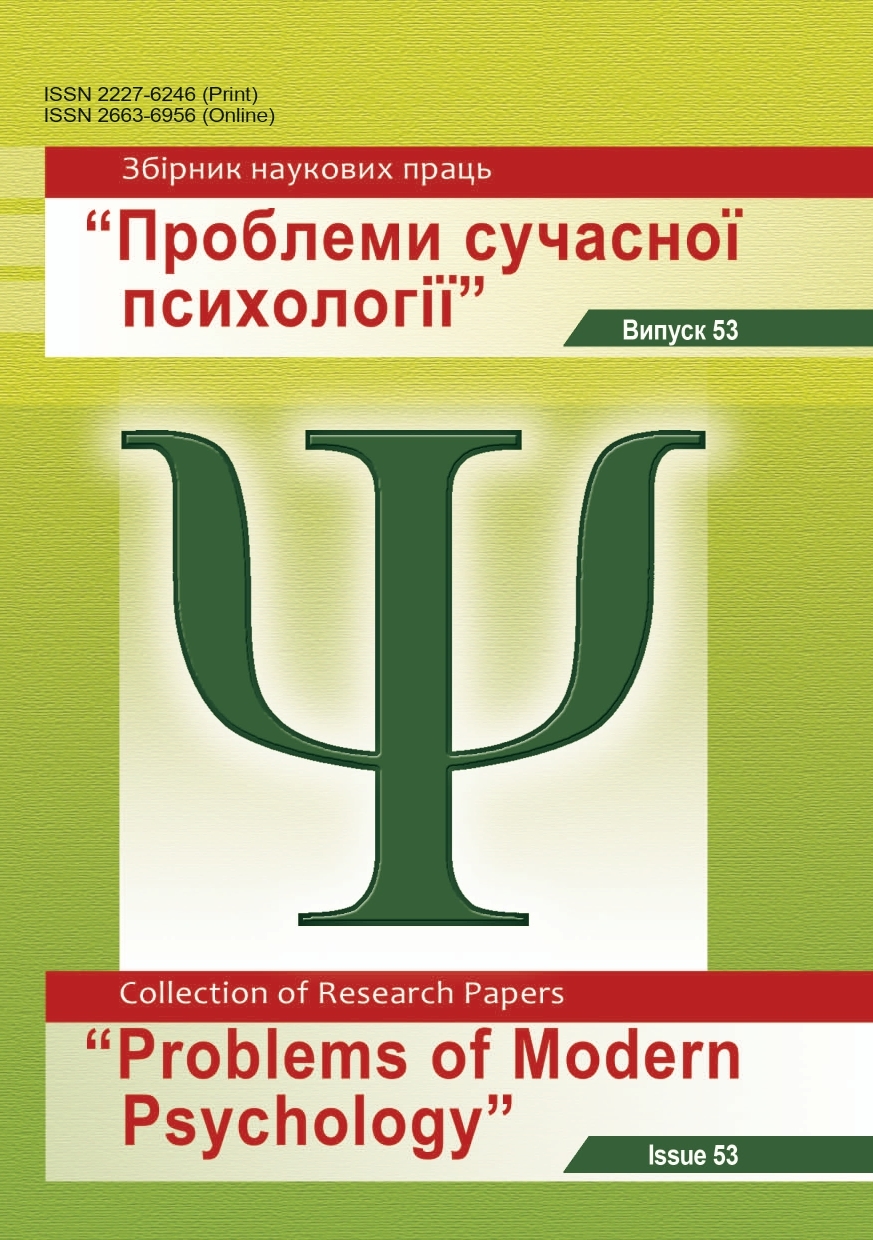Особливості розуміння молодими людьми новинної інформації з різних типів ЗМК
DOI:
https://doi.org/10.32626/2227-6246.2021-53.173-190Ключові слова:
засоби масової комунікації (ЗМК), інформація, молоді люди, ступінь довіри, категорії свідомостіАнотація
Мета статті – встановити специфіку оцінки та розуміння молодими людьми інформації про поточні події в країні та світі, одержуваної з різних ЗМК (новинні інтернет-портали, соціальні мережі, телевізійні передачі, періодичні друковані видання).
Методи. Дослідження здійснено на вибірці студентів у віці від 17 до 23 років (дівчата, n = 120 і юнаки, n = 80). Емпіричне дослідження було спрямоване на вирішення трьох завдань. Перше – побудова ієрархії типів ЗМК за двома критеріями (частота звернення до джерела і ступінь довіри до нього). Вирішувалося це завдання за допомогою методики ранжування і кореляційного аналізу отриманих даних. Друге – аналіз уявлень молодих людей про характеристики інформації, що транслюється різними типами ЗМК. Для їх вивчення був використаний авторський варіант семантичного диференціала. Третє завдання – моделювання категорій свідомості, що опосередковують розуміння молодими людьми інформації з різних типів ЗМК; здійснювалася за допомогою факторизації даних семантичного диференціала.
Результати дослідження. Установлено, що максимальний ступінь довіри молоді люди демонструють щодо інформації про поточні події, яка отримується з інтернет-порталів, соціальних мереж, а також неформального спілкування. Мінімально вони довіряють повідомленням від представників адміністрації, а також від телебачення та друкованих видань. Порівняльний аналіз профілів оцінок характеристик інформації для різних типів ЗМК (інтернет-портали, соціальні мережі, телебачення і газети) виявив між ними статистично достовірні відмінності (р ≤ 0,01), за винятком інформації інтернет-порталів і друкованих видань. У результаті факторного аналізу зіставлено різну кількість категорій, які опосередковують розуміння інформації з різних типів ЗМК, що демонструє вищу когнітивну складність свідомості молодих людей у сфері цифрових медіа. Зміст трьох провідних категорій для різних типів медіа виявився фактично ідентичним.
Висновки. Виявлено прямий взаємозв’язок частоти звернення до інформаційного джерела і довіри до змісту повідомлення. У молодих людей присутній високий ступінь довіри до неофіційних джерел інформації і низький – до офіційних. В уявленнях молодих людей інформація з новинних інтернет-порталів переважно впливає на їх когнітивну сферу, а із соціальних мереж і ТБ – на емоційну. Загальним для новин із цифрових і друкованих медіа є кваліфікований підхід до їх створення. Недиференційованість змісту категорій, що опосередковують розуміння інформації з різних типів ЗМК, доводить їх малоусвідомлюваний характер і актуальність зусиль із розвитку самостійності й критичності мислення молодих людей.
Посилання
Aisina, R.M. (2019). Psikhologicheskaia bezopasnost internet-polzovatelei: analiz sovremennykh issledovanii [Psychological safety of Internet users: analysis of modern research]. Vestnik Omskogo universiteta. Seriia «Psikhologiia» – Herald of Omsk University. Series «Psychology», 1, 28–38. DOI 10.25513/2410-6344.2019.1.28-38 [in Russian].
Gorbunov, K.G. (2016). Protivodeistviie terroristicheskoi propagande v Internete [Countering terrorist propaganda on the Internet]. Vestnik Omskogo universiteta. Seriia «Psikhologiia» – Herald of Omsk University. Series «Psychology», 2, 23–35 [in Russian].
Drobysheva, T.V., Emelianova, T.P., Drobysheva, M.M., & Shmidt, D.F. (2019). Obsuzhdeniie problemy bezrabotitsy v sviazi s pensionnoi reformoi v pechatnykh SMI i v Internete [Discussion of the problem of unemployment in connection with the pension reform in the print media and on the Internet]. Vestnik Universiteta Rossiiskoi akademii obrazovaniia – Bulletin of University of Russian Academy of Education, 3, 49–54 [in Russian].
Kirillov, I.P., & Solovieva, D.A. (2020). Psikhologicheskaia bezopasnost detei doshkolnogo vozrasta pri rabote s kompiuterom i internet-sredoi [Psychological safety of preschool children when working with a computer and the Internet environment]. Vestnik prakticheskoi psikhologii obrazovaniia – Bulletin of practical psychology of education, 17 (1), 80–84 [in Russian].
Krinitskii, V.A. (2019). Politicheskaia propaganda ekstremizma kak sredstvo manipuliativnogo vozdeistviia na molodezh [Political propaganda of extremism as a means of manipulative influence on youth]. Gumanitarnyie, sotsialno-ekonomicheskiie i obshchestvennyie nauki – Humanities, socio-economic and social sciences, 11, 66–69 [in Russian].
Onufrіeva, L.A., Dіdyk, N.M., & Chekanska, O.M. (2019). Psykholohіchnі osoblyvostі vykorystannia studentamy іnternet-prostoru [Psychological characteristics of using Internet space by students]. Іnformatsіinі tekhnolohii і zasoby navchannia – Information technologies and teaching aids, 74 (6), 250–265 [in Ukrainian].
Petrenko, V.F. (2005). Osnovy psikhosemantiki [Basics of psychosemantics]. Sankt-Peterburg : Piter [in Russian].
Salikhov, A.M., & Krasnoshchechenko, I.L. (2020). Manipuliatsiia soznaniiem: kak snizit riski ekstremistskikh vliianii na molodezh [Consciousness manipulation: how to reduce the risks of extremist influences on youth]. Prikladnaia yuridicheskaia psikhologiia – Applied Legal Psychology, 2 (51), 15–23. DOI 10.33463/2072-8336.2020.2(51).015-0123 [in Russian].
Chusavitina, G.N., Davletkireieva, L.Z., & Novikova, T.V. (2016). Analiz sovremennogo sostoianiia issledovaniia problemy formirovaniia u studentov universiteta ustoichivosti k tekhnologiiam negativnogo informatsionno-psikhologicheskogo vozdeistviia v seti internet [Analysis of the current state of research on the formation of university students’ resistance to technologies of negative information and psychological impact on the Internet]. Sovremennyie naukoemkiie tekhnologii – Modern high technologies, 22 (2), 397–400 [in Russian].
Osgood, C.E., Suci, G., & Tannenbaum, P. (1957). The measurement of meaning. Chicago and London : University of Illinois Press.
Zhang, J., Carpenter, D., & Ko, M. (2013). Online astroturfing: A theoretical perspective. Proceedings of the Nineteenth Americas Conference on Information Systems, August 15–17, 2013. Chicago, Illinois. Retrieved from https://www.researchgate.net/profile/Darrell_Carpenter/publication/286729041.
##submission.downloads##
Опубліковано
Як цитувати
Номер
Розділ
Ліцензія
Авторське право (c) 2021 Медведская Елена

Ця робота ліцензується відповідно до Creative Commons Attribution-NonCommercial 4.0 International License.
Редакція має повне право публікувати у Збірнику оригінальні наукові статті як результати теоретичних і експериментальних досліджень, які не знаходяться на розгляді для опублікування в інших виданнях. Автор передає редколегії Збірника права на розповсюдження електронної версії статті, а також електронної версії англомовного перекладу статті (для статей українською та російською мовою) через будь-які електронні засоби (розміщення на офіційному web-сайті Збірника, в електронних базах даних, репозитаріях та ін).
Автор публікації зберігає за собою право без узгодження з редколегією та засновниками використовувати матеріали статті: а) частково чи повністю в освітніх цілях; б) для написання власних дисертацій; в) для підготовки абстрактів, доповідей конференцій та презентацій.
Автор публікації має право розміщувати електронні копії статті (у тому числі кінцеву електронну версію, завантажену з офіційного web-сайту Збірника) на:
- персональних web-ресурсах усіх Авторів (web-сайти, web-сторінки, блоги тощо);
- web-ресурсах установ, де працюють Автори (включно з електронними інституційними репозитаріями);
- некомерційних web-ресурсах відкритого доступу (наприклад, arXiv.org).
Але в усіх випадках обов’язковою є наявність бібліографічного посилання на статтю або гіперпосилання на її електронну копію, що містяться на офіційному сайті Збірника.






